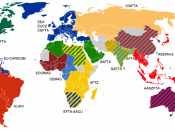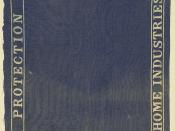Protection:
*Free trade enables greater competition, higher quality goods, economic growth and lower prices.
*Free trade increases real incomes as prices are lower and consumers buying power will be increased.
Through specialization countries can produce outside their PPF
Arguments for protection:
*Protection benefits small developing industries whereas free trade benefits the general public
*Governments can us protection to gain political advantage-they 'buy' votes from the industries they protect
*Cost of protection for the PMV and TCF industries amount to over 2 billion a year; this is 2 billion that consumers do not have to spend on other goods and services
The infant industries argument:
New developing industries require protection in early years until they mature and can take advantage of economies of scale. These industries should then naturally become internationally competitive and develop a comparative advantage. This is often not the case as the industries become accustomed to the lack of competition and the protection becomes long term rather than short term.
Infant industries protection can be justified as long as the level of protection is reduced over time
The diversification argument:
If comparative advantage was fully adopted and countries specialized in only a few industries (placing all industries in these sectors) then changes in the world's demand and price would have a huge effect on the economy. So it is better to diversify industries and thus resources, so as to not 'place all of one's eggs in the same basket'. In this case protection is needed to start up the industry and as the industry becomes more competitive the level of protection can be decreased.
Anti-dumping argument:
Dumping is when an overseas firm sells products in a country below its cost of production in an effort to drive out the domestic producer. These firms may be large enough to...


